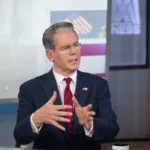New research reveals significant insights into the effectiveness of sanctions in curbing illicit activity in the cryptocurrency space. A detailed report led by Professor John M. Griffin from the University of Texas at Austin assesses the impact of sanctions and anti-money laundering (AML) measures, specifically focusing on the Tornado Cash crypto mixer.
The findings highlight a dramatic 60% decline in monthly transaction volumes on Tornado Cash following sanctions imposed by the Office of Foreign Assets Control (OFAC) in 2022. These sanctions targeted the protocol due to its involvement in facilitating over $7 billion in illicit funds. The immediate responses from cryptocurrency exchanges were notable, as they swiftly blocked interactions with addresses linked to the mixer.
Griffin and his colleagues concluded that sanctions and asset freezes have proven costly for criminal operations. However, the lifting of sanctions on Tornado Cash in March raises new concerns, especially in light of recent developments in crypto regulatory frameworks.
The Senate Banking Committee’s proposed market structure bill includes provisions that could shield certain crypto protocols from traditional AML and Bank Secrecy Act (BSA) regulations. Notably, developers of smart contracts who lack unilateral control over their deployment may not be classified as money transmitters, thus potentially evading regulatory scrutiny. Conversely, centralized front-end operations and relayers would remain subject to existing regulations.
The legal consequences for developers remain pronounced, as evidenced by the recent conviction of Tornado Cash co-founder Roman Storm for conspiracy related to operating an unlicensed money transmitting business. Similarly, the team behind a rival service, Samourai, faced similar charges. Experts suggest that if the regulatory changes had been implemented earlier, these developers might have avoided such legal repercussions.
While the proposed changes have arrived too late for the Tornado Cash and Samourai developers, there is hope among some experts that the revisions could safeguard future innovators in the crypto industry from facing severe legal challenges. However, not everyone shares this optimism. Critics like Lee Reiners, a financial regulation expert at Duke University, warn that the proposed regulations might inadvertently create pathways for illicit financial operations. Reiners contended that developers could easily create new, unregulated crypto mixing services without adequate oversight.
On the other hand, some, like Ari Redbord from TRM Labs, argue that the proposed regulations do not offer a loophole for illicit activities. He emphasized that while certain protocols might not be seen as money transmitters, they still remain within the purview of law enforcement.
As the legislative process unfolds, uncertainties abound regarding the final shape of these regulations. Although there was a deadline set by David Sacks, US President Donald Trump’s crypto czar, to finalize market structure rules by September, it appears that lawmakers will require more time to craft effective legislation.







